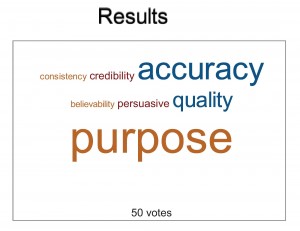Evaluating Song Lyrics
Group Assignment:
- Compare the lyrics from U2’s song “All I Want is You” on the handout to the lyrics from one of the three songs in Etheridge’s essay “Music as a Safe Haven” (525-31).
- Of the two songs, which lyrics represent better poetry—which has a more effective argument, and how do you know?
- Post a paragraph or a list in response to the questions above as a comment to this blog post. Be sure to introduce the songs you selected by title and note the names of the people in your group.
Other Resource:
Sharon L. Williams Andrews provides the following “Song-Analysis Questions” for her Introduction to Poetry course at Louisiana State University. Before posting your group’s response, consider Andrew’s questions below to generate possible criteria for your evaluation:


